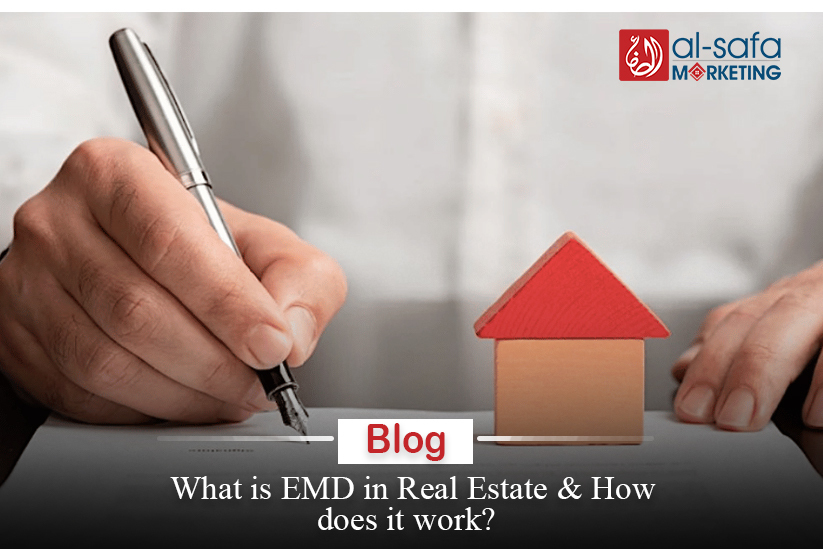Introduction
“What is EMD in Real Estate and How does it work?” is always been a hot topic. People normally misunderstand EMD. To clear the concept of many people here is a detailed blog on it.
What is an EMD?
The full form of “EMD” is Earnest Money Deposit. It is also called a “good faith deposit.” It represents a buyer’s good faith in buying a home. When signing the purchase agreement, EMD is mostly given to a real estate agent. The selling or listing agent often deposits it. The EMD is placed in an escrow account until the contract closes. Until the contract closes, the EMD is placed in an escrow account. Then this money is applied to the buyer’s transaction fees, closing costs, or down payment. You must protect your EMD by understanding the terms of your contract and following deadlines. You should protect your EMD by understanding the terms of your contract and following deadlines.
How Does Earnest Money Work?
When someone wants to buy a house, they have to give some money to that real estate company to show that they are serious about buying it. This money is called the earnest money deposit.
Usually, people give this money when they sign a paper that says they want to buy the house. But sometimes, people give the money when they first make an offer to buy the house. It depends on where you are and what the custom is.
As the person buying the house goes through the process of buying it, they have to show that they really want to buy it. They do this by giving more and more money. The earnest money deposit is the first bit of money they give.
If the person buying the house changes their mind and doesn’t want to buy it, they might lose this money. The closer they get to actually buying the house, the harder it is to get the money back. Once the person buying the house gets a loan to pay for it and they don’t have any more reasons to back out, they can’t get the money back if they change their mind.
Real estate agents will say that a house is “pending” when they are pretty sure that the person buying it is going to actually buy it. They will only say it’s “contingent” if there are still things that could make the person change their mind.
How Much Are the Earnest Money Amounts?
When someone buys a house, they usually have to give some money upfront to show that they are serious about buying it. This money is called the earnest money deposit. The amount of money they have to give is usually 1-2% of the price of the house, but in some places where lots of people want to buy houses, it can be as much as 5-10% of the price. Sometimes, the seller will say exactly how much money the buyer has to give, like $5,000 or $10,000.
If the buyer doesn’t give the earnest money deposit, the seller can sell the house to someone else. Sometimes the seller will ask for more money from the buyer at different times while they are still deciding whether or not to buy the house. If the buyer doesn’t give this extra money, the seller can sell the house to someone else and keep some of the earnest money the buyer already gave them.
How Is Earnest Money Paid?
When someone wants to buy a house, they have to give the earnest money to show they really want to buy it. They can give the money using a special bank account called an escrow account. The money stays in this account until they actually buy the house. Then the money is used to pay for some of the costs of buying the house.
Sometimes, the money in the escrow account will earn more money from the bank. If this happens and the extra money is more than $600, the person buying the house has to tell the government so they can pay taxes on it. Normally, a real estate marketing company is also involved in the process.
EMD Tips and Best Practices
When you want to buy a house, you have to give some money to show that you really want to buy it. This money is called the earnest money deposit. It’s usually 1% of the price of the house you want to buy. For example, if the house costs $150,000, you would give $1,500.
This cash demonstrates your commitment to purchasing the home. It also means the seller won’t sell the house to anyone else while you are checking it to make sure you want to buy it. If you change your mind and don’t want to buy the house, you might lose this money.
You should give this money to a good company that will hold it for you until you actually buy the house. Don’t give it directly to the person selling the house. You can get help with this from your real estate agent.
Conclusion
A buyer can use an earnest money deposit to show they are serious about buying a house. To make the process easier, it’s important to have a team that includes a Realtor, settlement company, and attorney. The Realtor is the most important member of the team and can help you find the others you need to buy a house successfully and avoid any mistakes.
Also Read: Is Digital Real Estate Legit or a scam?



